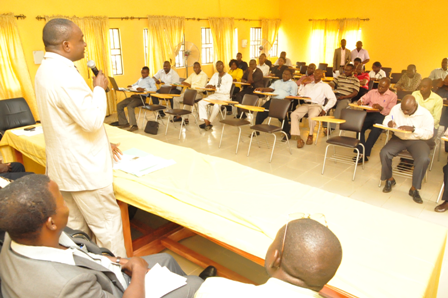
Rep. of the VC, the DVC (D), Prof. Felix Salako addressing the participants during the Training Workshop held, recently.
The Directorate of University Farms (DUFARMS), Federal University of Agriculture, Abeokuta (FUNAAB) on Wednesday, held a Pre-Season Training Workshop for its Senior Staff.
In his Opening Remarks, the Vice-Chancellor of FUNAAB, Professor Olusola Bandele Oyewole represented by the Deputy Vice-Chancellor (Development), Professor Felix Salako said that as the University is now celebrating her Silver Jubilee Anniversary, we must be strategically positioned as a food basket not only for our immediate environment but throughout Ogun State and beyond.
He commended the leadership of DUFARMS for the innovative and motivational topics packaged for the workshop noting that it will be a spring-board for the Directorate while equipping the staff with the much needed skills to improve their performances on the job.
“Let me say categorically here today that the University believes in and it is proud of her staff, most especially in the transformed Directorate, hence achieving the desired results can never be a problem. This is the more reason why this type of laudable programme cannot have been more timely than now”, he added.
The Acting Deputy Director, DUFARMS, Mr. Michael Ayo Jaiyeola in his brief remark expressed appreciation to the University Management for their unflinching support in all ramifications, adding that the Directorate will do everything humanly possible to succeed in this new farming year.
He noted that the essence of organizing the workshop is to equip all the Senior Staff of DUFARMS with necessary Technical and Management Skills for their effectiveness in the new dispensation.
Dr. Kehinde Adebowale Elemo of the College of Plant Science and Crop Production (COLPLANT),in his Lecture titled, “Current Trends and Developments in Sustainable Crop Production Practices” highlighted the objectives of sustainable farming system practices which includes simulate optimum “forest-floor” conditions, Reduce evaporative loss of moisture from soil surface, Reduce evaporative loss from upper soil layers, Increase, maintain nitrogen levels in root zone, Minimize temperature fluctuations at soil surface, among others.
Dr. Elemo in his paper disclosed that inadequate economic and political systems, conflict, adverse weather, lack of crop production support mechanisms, inadequate funds for research and development, inefficient marketing structures and limited pool of trained scientists as some of the potential constraints for sustainable farming system practices.
He recommended seven management practices for sustainable crop production intensification which include minimum soil disturbance, permanent organic soil cover, species diversification and use of high-yielding adapted varieties from good seed.
Others are integrated pest management, plant nutrition based on healthy soils and efficient water management.
Professor (Mrs.) Olufunmilayo Adebambo of the Department of Animal Breeding and Genetics, FUNAAB in her paper presentation titled, “Current Trends and Development in Sustainable Livestock Improvement and Production Practices”, noted that trends in Livestock improvement varies from breeds and breeding, systems of rearing, housing, feeding and new technological methods used to accelerate selection and genetic improvement.
The Animal breeding expert said that Livestock production is an important feature of the Nigerian agriculture adding that it plays major economic, social and cultural roles in the living standards of farmers, processors, traders, consumers as well as the general public.
“As a specialized Federal University of Agriculture, the onus rests on us to advice the government on the fact that growth in agriculture in general livestock in particular, is twice as effective at reducing poverty and creating more employment opportunities than growth in other sectors of the economy”, she added.
Prof. (Mrs.) Adebambo further disclosed that if this country would embark on rapid animal protein production and consumption, there is need to concentrate on animals with shorter generation intervals like poultry, rabbits and pigs while waiting for the ones with longer generation intervals to come up.
She noted that misdirected, inappropriate funding, lack of leadership that will realize that it costs more to import improved breeds of other countries than to develop our own are the problems associated with livestock production improvement in the country.
The Don stressed that there is real need to work at modernization and commercialization of our agriculture and livestocks sectors for greater impact.
